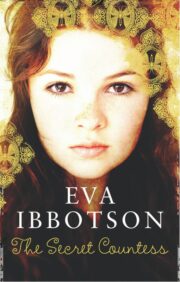The Secret Countess
by
Eva Ibbotson
For Jane
The Author
Eva Ibbotson was born in Vienna, but when the Nazis came to power her family fled to England and she was sent to boarding school. She planned to become a physiologist, but hated doing experiments on animals and was rescued from some fierce rabbits by her husband-to-be. She became a writer while bringing up her four children, and her bestselling novels for both adults and children have been published around the world. Her books have also won and been shortlisted for many prizes. Journey to the River Sea won the Nestlé Gold Award and was runner-up for the Whitbread Children’s Book of the Year and the Guardian Fiction Award. The Star of Kazan won the Nestlé Silver Award and was shortlisted for the Carnegie Medal. Eva lives in Newcastle.
Books by Eva Ibbotson
A Song for Summer
The Star of Kazan
Journey to the River Sea
The Beasts of Clawstone Castle
The Great Ghost Rescue
Which Witch?
The Haunting of Hiram
Not Just a Witch
The Secret of Platform 13
Dial a Ghost
Monster Mission
Coming soon
The Morning Gift
PROLOGUE
In the fabled, glittering world that was St Petersburg before the First World War there lived, in an ice-blue palace overlooking the river Neva, a family on whom the gods seemed to have lavished their gifts with an almost comical abundance.
Count and Countess Grazinsky possessed — in addition to the eighty-roomed palace on the Admiralty Quay with its Tintorettos and Titians, its Scythian gold under glass in the library, its ballroom illuminated by a hundred Bohemian chandeliers — an estate in the Crimea, another on the Don and a hunting lodge in Poland which the countess, who was not of an enquiring turn of mind, had never even seen. The count, who was aide de camp to the tsar, also owned a paper mill in Finland, a coal mine in the Urals and an oil refinery in Sarkahan. His wife, a reluctant lady of the bedchamber to the tsarina, whom she detested, could count among her jewels the diamond and sapphire pendant which Potemkin had designed for Catherine the Great and had inherited, in her own right, shares in the Trans-Siberian Railway and a block of offices in Kiev. The countess’s dresses were made in Paris, her shoes in London and though she could presumably have put on her own stockings, she had never in her life been called upon to do so.
But the real treasure of the Grazinsky household with its winter garden rampant with hibiscus and passion flowers, its liveried footmen and scurrying maids, was a tiny, dark-haired, bird-thin little girl, their daughter, Anna. On this button-sized countess, with her dusky, duckling-feather hair, her look of being about to devour life in all its glory like a ravenous fledgling, her adoring father showered the diminutives which come so readily to Russian lips: ‘Little Soul’, of course, ‘Doushenka’, loveliest of endearments but, more often, ‘Little Candle’ or ‘Little Star’, paying tribute to a strange, incandescent quality in this child who so totally lacked her mother’s blonde, voluptuous beauty and her father’s traditional good looks.
Like most members of the St Petersburg nobility, the Grazinskys were cultured, cosmopolitan and multilingual. The count and countess spoke French to each other. Russian was for servants, children and the act of love; English and German they used only when it was unavoidable. By the time she was five years old, Anna had had three governesses: Madame Leblanc, who combined the face of a Notre Dame gargoyle with a most beautiful speaking voice, Fräulein Schneider, a devout and placid Lutheran from Hamburg — and Miss Winifred Pinfold from Putney, London.


"The Secret Countess" отзывы
Отзывы читателей о книге "The Secret Countess". Читайте комментарии и мнения людей о произведении.
Понравилась книга? Поделитесь впечатлениями - оставьте Ваш отзыв и расскажите о книге "The Secret Countess" друзьям в соцсетях.